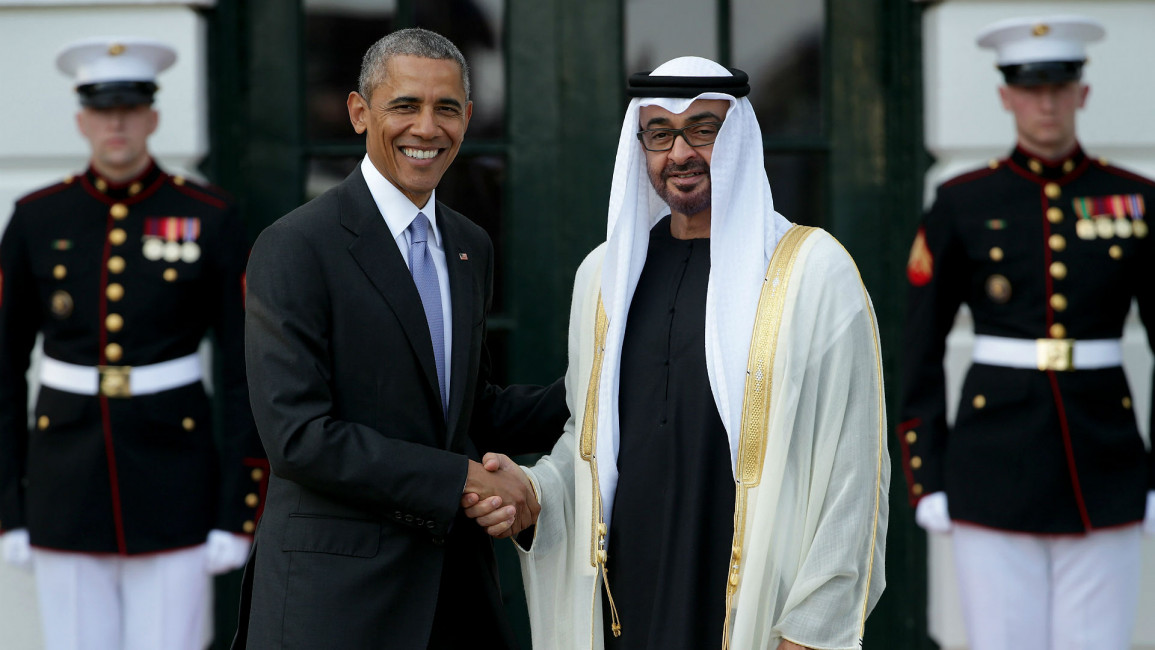Obama says US 'stands by' Arab Gulf allies
President Barack Obama sought to reassure Arab allies that they are safe from the threat of an empowered Tehran as he seeks to shore up some of America's most critical security partnerships. However, Obama's claim of winning Arab support for his nuclear diplomacy appears far from certain.
'A new era in relations'
After a rare Camp David summit, the president on Thursday pledged Washington's "ironclad commitment" to the governments of the Gulf and even spoke of authorising military force if their security is endangered by Iran or anyone else.
The United States, he vowed, will "use all elements of power to secure our core interests in the Gulf region, and to deter and confront external aggression against our allies and partners."
Obama invoked the start of a "new era of cooperation" that would last for decades to come, even as Saudi Arabia and others in the region are deeply unnerved by the prospect of an accord with Iran that would impose a decade-long freeze on its nuclear programme and potentially provide it tens of billions of dollars' worth of relief from international sanctions.
Iran deal
Arab leaders from the Gulf came to Washington looking for assurances that Obama would combine his diplomatic effort with a broader strategy to push back against what they say is Iran's expanding influence in the Middle East.
The US and other world powers hope to clinch a final nuclear deal with Iran by the end of June.
This week's talks at Camp David with top officials from the kingdoms of Bahrain, Kuwait, Oman, Qatar, Saudi Arabia and the United Arab Emirates were announced by Obama on April 2, when a framework with the Iranians was sealed.
Washington has long provided military support to its Gulf partners, inclduing the invasion of Iraq in 1991 after its takeover of Kuwait.
But Arab states fear a negotiated end to the Iran nuclear standoff would serve to enrich and empower a government in Tehran already keeping Syrian President Bashar Assad in power, fueling Yemen's rebellion, intimidating opponents in Iraq and Lebanon and meddling in the affairs of others through the region.
Obama on Thursday pledged to take their partnership to another level with greater cooperation on everything from ballistic missile defence, maritime security and cybersecurity to joint military exercises and training.
Counterterrorism coordination will tighten to stem the flow of foreign fighters to terrorist groups, protect vulnerable infrastructure and halt terror financing, he said.
In a joint statement, the countries vowed to address regional challenges including Syria, Iraq, Yemen and Libya.
US domestic politics
The sensitivities of the Arab governments, along with Israeli objections, are part of the compendium of challenges facing Obama as he tries to finalise an agreement with Iran.
Obama's biggest test may come from home, however.
Congress on Thursday sent Obama a bill enabling lawmakers to hold an up-or-down vote on an Iran deal, after House Republicans and Democrats overwhelmingly approved the measure.
The vote was 400-25; the Senate voted in favor 98-1 last week. Obama will sign it into law, White House press secretary Josh Earnest said.
Saudi reaction
At the summit-closing news conference, Obama said Gulf leaders hadn't been asked to "sign on the bottom line" to approve a work in process.
They agreed, he said, "that a comprehensive, verifiable solution that fully addresses the regional and international concerns about Iran's nuclear program is in the security interests of the international community, including our GCC partners."
Saudi Foreign Minister Adel al-Jubeir, one of the attendees, was more circumspect.
Arab leaders were "assured that the objective is to deny Iran the ability to obtain a nuclear weapon," al-Jubeir said, but he added:
"It would be too early to prejudge what we accept, what we don't accept."
Obama rarely uses Camp David for personal or official business and White House aides hoped the more intimate setting would foster candid conversation.
But just two other heads of state, the emirs of Qatar and Kuwait, attended. The others sent lower-level, though still influential, representatives.
The most notable absence was Saudi King Salman, who announced over the weekend he was skipping the event only two days after the White House announced his attendance. Crown Prince Mohammed bin Nayef and Deputy Crown Prince Mohammed bin Salman represented Saudi Arabia instead.
The most embarrassing absence, for the US, was Bahrain's King Hamad bin Isa Al Khalifa. He rejected the summit for a horse show in Britain and meeting with Queen Elizabeth II






 Follow the Middle East's top stories in English at The New Arab on Google News
Follow the Middle East's top stories in English at The New Arab on Google News
![At least 400 Palestinians have been killed in north Gaza in Israel's over two-week siege [Getty]](/sites/default/files/styles/image_330x185/public/2179471542.jpeg?h=a5f2f23a&itok=usKQc6NU)
![Zammel was handed three 20-month sentences in three cases [Getty]](/sites/default/files/styles/image_330x185/public/2175903251.jpeg?h=cb957c44&itok=rS0fDZb6)
